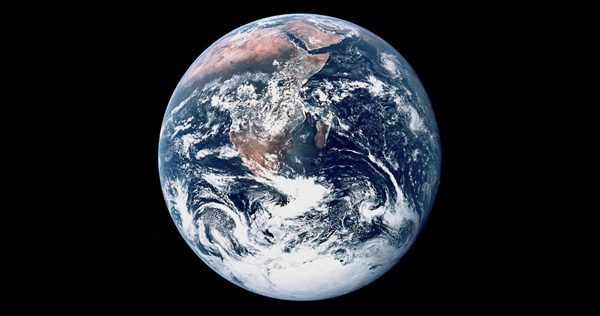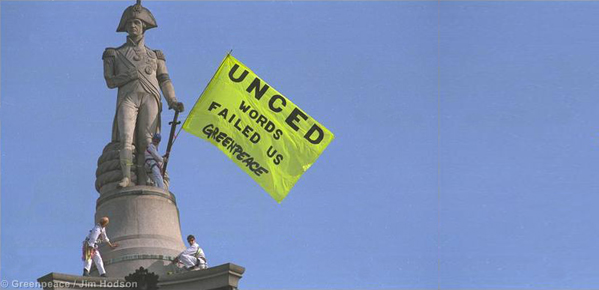Once every 10 or 20 years, something remarkable happens. World leaders take note of the perilous state of our planet and its poorest inhabitants and think, "Good heavens, someone ought to do something about this."
And looking around they realize, "Oh... that would be us." So they have a Summit. Come to think of it, that's a nice word for a conference of global leaders, with all its connotations of lofty heights and glorious achievement.
And here we go again. The United Nations Conference on Sustainable Development, generally referred to as Rio +20, will take place in five short months. "Informal informals," UN-speak for pre-negotiations, were held last week to debate what it is our leaders in Rio will actually decide.
Rio +20 is actually somewhat of a misnomer. It could better have been named Stockholm +40 given that the first Earth Summit -- the United Nations Conference on the Human Environment -- took place in Stockholm in June 1972.
I was in high school then. Astronauts had recently landed on the moon, and the image of the Earth as seen from space had become the icon of the burgeoning environmental movement. Even back then, however, governments recognized that "the environment" isn't a single issue -- it's all tangled up with economic and social issues. To quote the Stockholm Declaration, "the protection and improvement of the human environment is a major issue which affects the well-being of peoples and economic development throughout the world."
 Public Domain: NASA, 2011
Public Domain: NASA, 2011
In other words, our iconic Earth was not just a big ball with blue oceans, green forests and swirling clouds; if Google Earth had existed then, we could have zoomed in to see the 3.8 billion people inextricably linked to her ecosystems.
Fifteen years after Stockholm, the inseparability of environmental, economic, and social well-being was enshrined as the three pillars of 'sustainable development,' a new term which promised a little something for everyone; like a long-term destination but which somehow forever remains on the horizon. 40 years after Stockholm, sustainable development is now dressed up as "the Future We Want" -- the title of the first, so-called "zero" draft of the Rio outcome document.
But as Brazilian Environment Minister Izabella Teixeira said in a speech to the World Social Forum which also took place last week, "Twenty years ago, the focus was on the future. Now we have the urgency of the present." Exactly! Looking to the past and to the future is important, but the present is where the action happens.
Reading the zero draft, I was reminded of the French saying "plus ça change, plus c'est la même chose." This translates roughly as -- the more things change, the more they stay the same. Compare the language in 40 years of declarations:
We see around us growing evidence of man-made harm in many regions of the earth: dangerous levels of pollution in water, air, earth and living beings; major and undesirable disturbances to the ecological balance of the biosphere; destruction and depletion of irreplaceable resources; and gross deficiencies, harmful to the physical, mental and social health of man, in the man-made environment, particularly in the living and working environment.
Humanity stands at a defining moment in history. We are confronted with a perpetuation of disparities between and within nations, a worsening of poverty, hunger, ill health and illiteracy, and the continuing deterioration of the ecosystems on which we depend for our well-being. However, integration of environment and development concerns and greater attention to them will lead to the fulfilment of basic needs, improved living standards for all, better protected and managed ecosystems and a safer, more prosperous future. No nation can achieve this on its own; but together we can - in a global partnership for sustainable development.
The global environment continues to suffer. Loss of biodiversity continues, fish stocks continue to be depleted, desertification claims more and more fertile land, the adverse effects of climate change are already evident, natural disasters are more frequent and more devastating, and developing countries more vulnerable, and air, water and marine pollution continue to rob millions of a decent life.
Rio 2012 (zero draft):
Food insecurity, climate change and biodiversity loss have adversely affected development gains. New scientific evidence points to the gravity of the threats we face. New and emerging challenges include the further intensification of earlier problems calling for more urgent responses. We are deeply concerned that around 1.4 billion people still live in extreme poverty and one sixth of the world's population is undernourished, pandemics and epidemics are omnipresent threats. Unsustainable development has increased the stress on the earth's limited natural resources and on the carrying capacity of ecosystems. Our planet supports seven billion people expected to reach nine billion by 2050.
That feeling of déjà vu is not restricted to government documents. A Rio '92 veteran recently sent around our old joint NGO "10 Point Plan to Save the Earth Summit."
- Legally binding targets and timetables to combat climate change
- A plan for reducing unsustainable consumption
- A process of economic reform to ensure "ecologically sound and socially equitable development
- Better controls on transnational corporations.
It's not for nothing we coined the term "greenwash" at the time -- corporate polluters then, and corporate polluters now, are at the heart of much of what is wrong with the world.
It is a familiar refrain from youth delegations to many international meetings today: "You have been negotiating our whole lives!" The weird thing, now that I think of it, is that the same thing largely holds true for me. Plus ça change, plus c'est la même chose...
If all of this comes across as unduly cynical, please keep reading, because in fact I am the proverbial eternal optimist.
In an effort to break new ground in the run-up to Rio 2012, UN Secretary-General Ban Ki-moon asked 22 influential people (most of whom are current or former heads of state or ministers) to serve on a High-Level Panel on Global Sustainability. Their report, launched today in Addis Ababa, is likely to be less important for what it says, than for the degree to which the authors use their influence to promote its recommendations within their own countries and networks in the coming months.
Like any such document negotiated by representatives from diverse and competing national interests (a microcosm of the UN itself) it reflects the art of compromise and nuanced language. It also contains an overview -- with facts and figures -- of where we've made progress against long-term goals, and where we haven't.
Looking at it side-by-side with the zero draft, the two have a number of things in common, but one stands out as particularly important: the treatment of perverse subsidies -- financial incentives which promote precisely the kinds of unsustainable development which governments have promised to end.
Zero draft: "Agree to gradually eliminate subsidies that have considerable negative effects on the environment and are incompatible with sustainable development."
Global Sustainability Panel: "Phase out fossil fuel subsidies and reduce other perverse or trade distorting subsidies by 2020."
Gradually? 2020? As noted by the Panel:
Three of the most heavily subsidized sectors in the world are agriculture, energy and fisheries. In 2009, Governments around the world spent an estimated $312 billion subsidizing fossil fuel consumption and an additional $100 billion subsidizing fossil fuel production. In the same year, OECD countries alone spent $384 billion subsidizing agricultural production and consumption. These subsidies are not merely expensive; they also distort trade markets, harm the environment, increase greenhouse gas emissions and slow poverty alleviation. According to the International Energy Agency, only 8 per cent of fossil fuel consumption subsidies in 2010 reached the poorest 20 per cent of the population.
Getting rid of perverse subsidies is clearly a win-win proposition (PDF) and governments increasingly recognize it as such. It has been picked up by the G20, and according to Jake Schmidt of NRDC: "In total, 53 countries have taken international commitments to reform and phase-out their fossil fuel subsidies including many of the world's largest economies... These commitments have yet to be met."
So here's my message to governments: What's taking you so long? By all means negotiate new targets and goals for 2020 or 2030, for example to improve energy efficiency and massively increase the share of renewable energy worldwide. But come to Rio prepared to demonstrate your commitment to action here and now. Let's hear your concrete plans for phasing out perverse subsidies as a start.

Photo Courtesy of Greenpeace International/Jim Hodson, 1992
And to NGOs: Let's mobilize. Rio 2012 is an important opportunity to foster a new generation of activists -- not to fight for another declaration of good intent, but for urgent and immediate action. This 1992 photo taken at the close of the first Rio conference should serve as a reminder that we must not let governments get away with simply acknowledging the challenges and responding with empty promises. Not this time.
In 10 years, time, when we celebrate the 50th anniversary of Stockholm, let's make sure we can say, "Plus ça change"... full stop.
